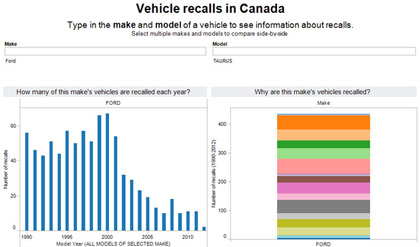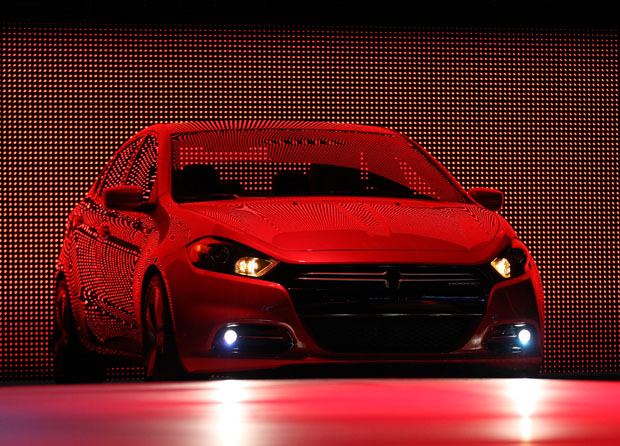Looking for a hassle-free new car? You might want to avoid brand-new models.

A Global News analysis of vehicle recalls in Canada shows that newly-introduced and redesigned models top the list of the most frequently-recalled consumer vehicles in Canada.
Global News analyzed vehicle recall data from Transport Canada for model years since 2000 to come up with lists of the most-recalled vehicles in the car, sport utility vehicle and light truck/van categories.
In each case, the most-recalled vehicles are models that were either just introduced to the market that year, or that had just undergone a major redesign.
HOW DOES YOUR CAR MEASURE UP? COMPARE VEHICLES WITH OUR INTERACTIVE TOOL

Among cars, the top spot is held by the 2000 Ford Focus, which has been named in 10 separate recalls over the years. In second place is the 2000 Ford Taurus, which has been named in eight recalls.
The Ford Focus was an all-new design that year, said George Iny, President of the Automobile Protection Association, a consumer advocacy group. “It hadn’t existed in North America before 2000. And Ford had a lot of quality issues the first two, three years the car was out. There weren’t just recalls, there were other issues as well.”
However, these quality issues didn’t last. “By 2003 they had fixed it,” said Iny.
Similarly, the Ford Taurus, which was redesigned in 2000, the year where it appears near the top of the list, “eventually became a very reliable car,” according to Iny.
A similar phenomenon is seen in the SUV category, where the 2002 GMC Envoy had 14 recalls as a newly-introduced vehicle, and to a lesser extent in the light truck/van category where the redesigned 2003 GMC Savana/Chevrolet Express had 11 recalls.
“What it tells you is first year vehicles get more recalls. And so if you’re buying in the first year, you probably want to avoid, based on this, Ford or GM. I think that’s legitimate to say that,” he said.

Get breaking National news
“If you’re thinking of buying a GM or Chrysler or Ford that’s all-new, we often tell people to wait for a year.”
Regarding its 2000 Taurus and Focus models, a spokesperson for the Ford Motor Company of Canada said that recalls on these decade-old vehicles are “not indicative of any quality issues in the vehicles we produce today,” and that Ford’s development and quality process have changed substantially since the vehicles were built.
Recalls don’t tell the whole story either. According to Maryse Durette, spokesperson for Transport Canada, “The number of recalls on a given vehicle make, model and model year is not a reliable indicator of vehicle safety. The most important indicators would likely be the relative frequency with which a vehicle is involved in collisions, the severity of those collisions, and the number and severity of casualties that occur as a result.”
“You can’t really rely just on the numbers,” said Iny. He gave a hypothetical explanation. “If (an automobile maker’s) car has one recall that happened after eight years and 14 deaths and 200 incidents, that wasn’t a very safe car. But you’d only see it as one recall.”
More than that, he said, some manufacturers are quicker to announce a recall than others. “Ford tends to be more diligent about announcing recalls than say GM, or Chrysler or Toyota, which never did for many years.”
With the Ford Focus and Taurus, “They didn’t wait until those safety issues had caused injuries. These were recalls that occurred for the most part quickly in the early years of the vehicle,” he said.
Ford Canada said that customer safety and satisfaction are top priorities for the company. “When we identify a potential issue, we respond quickly to do what is right for our customers.”
“It is very difficult to attribute a level of importance to a recall, as in many cases, although the implications of the safety-related defect may be severe, the actual number of occurrences may be very low. Recalls with less severe implications, where the defect occurs more frequently, could pose equal or greater risk,” said Durette. “For this reason, the departmental position has always been that ALL recalls are of great importance and to encourage Canadians to always have safety defects corrected.”
Vehicle manufacturers are required under the Motor Vehicle Safety Act to notify owners if their vehicle is subject to a recall. But they find out who the owner is through warranties and provincial vehicle registration records, which means that their information might be a bit out of date.
When buying a used vehicle, both Transport Canada and the Automotive Protection Association recommend checking the Transport Canada recalls database to see what recalls apply to that model.
Then, said Iny, “Call the service department of a dealer or the automaker’s customer service to be recorded as the owner of record in the event of future notifications. It’s easy for them to check for outstanding recalls with the vehicle serial number. You may also learn there are additional non-safety recalls that are not on the government database.”
Manufacturers are not required to conduct recall repairs free of charge, said Iny, but in practice most will.
And just because a used car has had many recalls, it doesn’t necessarily mean that you shouldn’t buy it, he said. When asked if he would consider purchasing a 2000 Ford Focus today, Iny said he would.
“They’re great purchases, even though there’s 10 recalls. Because all the known problems with the Focus in 2000 and 2001 have fixes now.” If the car was in good shape and all the recalls were performed, it would be a good buy, he said.
The most-recalled vehicles in Canada
Interestingly, when all vehicle categories are included in the recall analysis, the most-recalled vehicles in Canada are not consumer cars and vans, but instead transport trucks and school buses.
The data shows that the 2008 Freightliner Columbia is the most-recalled vehicle in Canada, named in 25 separate recalls. A bus, the 2007 Thomas built Saf-T-Liner C2 School Bus, has been named in 19 recalls.
However, according to Transport Canada, these numbers are less shocking than they might appear at first glance.
Transport trucks and buses are purchased differently from regular vehicles, said Maryse Durette, spokesperson for Transport Canada. “When a truck or bus is bought, the buyer can choose from a number of different options including different types and sizes of engine, configurations of transmissions, brake systems and axles, wheels and tires.” There could be thousands of different configurations of a given model, she said.
“The majority of recalls will apply to a small portion of the possible configurations and overall production – a relatively small number of vehicles sold,” she said. So while there are many recalls of these large vehicles, they generally only affect a few specific trucks or buses. Counting the number of recalls for each model is therefore not the best way to get an overall impression of recalls on large trucks and buses.
The tables below show the top five most-recalled vehicles for selected categories. Highlighted entries indicate where the vehicle was either a new model or had been newly-redesigned.
This data includes only recalls on model years 2000 and up, and is current as of March 19, 2012.
Top three most-recalled cars
Note: The Nissan Sentra newly redesigned model was given the 2001 model year designation only in Canada.
Top three most-recalled light trucks and vans
Note: The GMC Savana and Chevrolet Express are twin vehicles. The GMC Sierra and Chevrolet Silverado are also alike.
Top five most-recalled SUVs
Note: The GMC Envoy and Chevrolet Trailblazer are similar vehicles.
Editor’s Note: Story updated at 5:38 PM on June 20, 2012 to add comments from the Ford Motor Company of Canada.








Comments